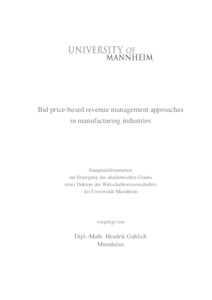|
Bid price-based revenue management approaches in manufacturing industries
Guhlich, Hendrik
![[img]](https://madoc.bib.uni-mannheim.de/41264/1.hassmallThumbnailVersion/Diss%20-%20Druckversion.pdf)  Vorschau |
|
PDF
Diss - Druckversion.pdf
- Veröffentlichte Version
Download (5MB)
|
|
URL:
|
https://madoc.bib.uni-mannheim.de/41264
|
|
URN:
|
urn:nbn:de:bsz:180-madoc-412642
|
|
Dokumenttyp:
|
Dissertation
|
|
Erscheinungsjahr:
|
2016
|
|
Ort der Veröffentlichung:
|
Mannheim
|
|
Hochschule:
|
Universität Mannheim
|
|
Gutachter:
|
Stolletz, Raik
|
|
Datum der mündl. Prüfung:
|
29 April 2016
|
|
Sprache der Veröffentlichung:
|
Englisch
|
|
Einrichtung:
|
Fakultät für Betriebswirtschaftslehre > ABWL u. Logistik (Fleischmann 2009-)
Fakultät für Betriebswirtschaftslehre > ABWL u. Produktion (Stolletz 2010-)
|
|
Fachgebiet:
|
330 Wirtschaft
|
|
Normierte Schlagwörter (SWD):
|
Revenue Management
|
|
Freie Schlagwörter (Englisch):
|
Order acceptance , order release , bid price , production
|
|
Abstract:
|
Whenever demand exceeds capacity, the available resources must be allocated to the incoming demand. A simple first-come-first-served allocation can lead to rather poor results if the demand is heterogeneous, i.e., if orders differ in their strategic importance for a company, their willingness to pay, their lead time requirements, etc. In addition, the decisions must be made under uncertainty because demand is often stochastic. If too many low value orders are rejected, capacity might remain unused. On the other hand, if too many low value orders are accepted, there might be not enough capacity to accept all high value orders. Apart from the order acceptance decision, it might also be preferable to delay the order release of already accepted orders, even if capacity is available, to reserve capacity for future high value orders.
This thesis considers the demand management decisions in different order-driven production environments. Orders are accepted or rejected immediately upon arrival, and at the beginning of each planning period, the set of orders to be released is selected. As exact solution methods are computationally intractable, bid price-based revenue management approaches are applied to maximize the contribution margin gained by accepted orders minus holding and backlog costs.
The first essay considers a deterministic single-stage assembly process, where both capacity and intermediate materials are scarce resources. In this essay, for each accepted order a due date is quoted and the accepted orders are scheduled such that the quoted due dates are kept. The second essay considers a deterministic multi-stage make-to-order production system. In this study, intermediate materials are assumed to be unlimited available. The third essay considers a multi-stage make-to-order production system with stochastic influences. To take into account that in these production systems, lead times depend non-linearly on the load of the system, clearing functions are used to model the production system.
|
 | Dieser Eintrag ist Teil der Universitätsbibliographie. |
 | Das Dokument wird vom Publikationsserver der Universitätsbibliothek Mannheim bereitgestellt. |
 Suche Autoren in Suche Autoren in
Sie haben einen Fehler gefunden? Teilen Sie uns Ihren Korrekturwunsch bitte hier mit: E-Mail
Actions (login required)
 |
Eintrag anzeigen |
|
|
